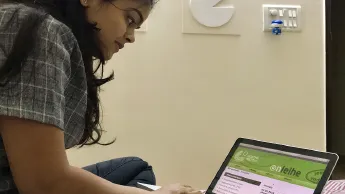Nitika Jain loves books. She loves German, too. The eLibrary is perfect for her: it gives her access to the Goethe-Institut’s digital library wherever she is. And currently, that means she can choose from among 40,000 German language media and translations of some works.
Nitika is currently reading Auerhaus by Bov Bjerk, a German author and cabaret artiste. “I’m really enjoying the novel,” says Nitika. She teaches German in New Delhi and is a huge fan of the eLibrary, the Goethe-Institut’s digital library (in German: “Onleihe”). It has been possible to borrow digital media for some time, but since 2016, users have been able to access the eLibrary collection wherever they are around the world.
Nitika has been using the digital library for a year now: “With the eLibrary, I can download novels, audiobooks and electronic newspapers for a specific period,” she says. She can browse 40,000 different German language digital media, including e-books, e-audiobooks, e-videos and e-newspapers. The collection spans fiction, music, user guides, books for children and young people, and language learning materials.
Onleihe beflügelt
The Goethe-Institut’s digital library “Onleihe” allows you to borrow digital media, including e-books, e-audiobooks and e-newspapers, 24 hours a day, 7 days a week.
Reading and listening to books
“Books are really important to me,” says Nitika: “I read a few pages almost every night, to get away from the background noise and just switch off.” The eLibrary is ideal for that: “At the moment, I’ve got three novels and the corresponding audiobooks on loan; I’ve downloaded them to my mobile. The online app means I can choose whether I read one of them, listen to it – or do both at the same time,” says Nitika. It’s also helping her to learn German. Digital borrowing comes into its own when readers are offline: “I can still read or listen to my novel, even when I’m travelling and don’t have access to the internet,” Nitika explains.
Always available – and free of charge
For Birgit Sekulski, who volunteers at the Goethe-Institut in Warsaw, the eLibrary has been a lifeline: “I’ve been a real bookworm since I was a child,” she says, “and I can’t imagine not reading.” Unfortunately, illness has seriously impaired her vision. “When that happened, it was as if my world had come crashing down,” Birgit recalls. The Goethe-Institut’s eLibrary has been a real boon: “All the material, from electronic books to audio books, is available at any time, and that means I can properly indulge my hunger for books and give my ears a treat!”
She never runs out of material, either: “The Goethe-Institut is constantly adding to its collection and encouraging users to browse. Even better, I don’t have to worry about subscriptions and high fees,” says Birgit. Nitika agrees: “What do I like best about the eLibrary? The free access to thousands of books. And there are no fines to pay: when a loan expires, the file is simply no longer accessible.”
The eLibrary is easy to use
So what do you need to be able to access the digital library and what steps do you need to take? The first thing you need, of course, is a PC, smartphone, tablet or e-reader. The will tell you whether your device is compatible. Then simply log on to , if you already have an account. Otherwise, register free of charge and then log on to “My eLibrary”. Smartphone and tablet users can download the “Onleihe app”, which is available for IOS and Android. The Goethe-Institut’s digital library is restricted to users outside German-speaking countries: those in German-speaking countries wishing to use it need to contact a local public library.
Reading pleasure at your fingertips
So how difficult is it to find your way around the comprehensive digital catalogue? “I had no trouble at all: the app is very user friendly,” says Nitika. The eLibrary makes it easy for users to search for, borrow and download material – it is a joy to use, she says.
“The app works just like other apps for electronic newspapers and books. The difference is that the eLibrary of the Goethe-Institut is free of charge, although you can only borrow material for a limited time. With other digital systems, you have to buy the material. Otherwise, it works in exactly the same way: for example, the eLibrary enables you to add bookmarks and comments,” explains Nitika.
It’s easy, she says – and huge fun. Nitika warmly recommends the eLibrary of the Goethe-Institut to other Germany-Alumni: “Just download the and enjoy reading free of charge!” she enthuses.

